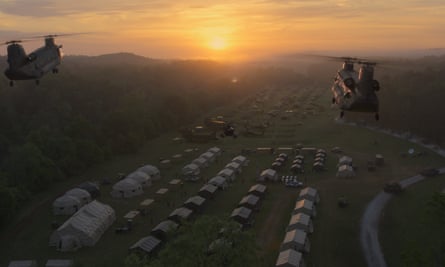After months of online speculation, writer-director Alex Garland’s button-pushing thriller Civil War has premiered at this year’s SXSW festival in Austin, Texas.
The film imagines what America would look like in the midst of full-scale civil war with broken supply lines, abandoned highways and a national military cleaved into opposing factions. Set to be released during a fractious election year, it shows a dystopian near future in which the US is riven by military conflict from within.
Civil War, starring Kirsten Dunst and Jesse Plemons, had been a question mark on the festival’s schedule – the trailer, which depicted battles in the nation’s capital and posed the question “what kind of American are you?”, drew criticism from some online for depicting such a conflict during a highly partisan political year in which one candidate declared “democracy is at stake” and the other has a history of subverting election laws.
The actual film, which garnered initial rave reviews from a packed audience at the Paramount Theatre in Austin, ultimately proved to not be as incendiary or controversial as feared.
Civil War offers a warning about the wholly destructive endpoint of polarization, but the story abstains from making direct connections to the current political climate and does not map neatly on to the current US political divide. In this imagining, for example, Texas and California are allies in the “Western Front” encroaching on Washington, where the three-term president, played by Nick Offerman, still has nominal control over some military and the eastern US.
It follows four combat journalists, played by Dunst, Wagner Moura, Cailee Spaeny and Stephen McKinley Henderson, as they travel from New York to the war’s frontline in Charlottesville, Virginia, across contested territory.
They observe atrocities and offenses from both sides. The president has abused executive power by authorizing drone strikes against American citizens and disbanding the FBI, but his political party, agenda or ideology stays unspecified. There are no obvious delineations by race, gender or class; characters’ allusions to a “real America” remain vague.
Such vagueness is a deliberate attempt to allow viewers to apply their own understanding of polarization to the story, according to Garland.
“The film is intended to be a conversation, so it doesn’t assert too much,” the Ex Machina and Annihilation film-maker said at Civil War’s first Imax screening in Austin.
Referring to not just Americans but citizens of his native England and other countries experiencing hyper-polarization and populism, Garland added: “We don’t need it explained. We know exactly why it might happen. We know exactly what the fault lines and pressures are.
“It didn’t feel appropriate” to lay out the politics, he said, as he wanted the film, reportedly the most expensive yet produced by the company A24, to allow for “finding points of agreement between everybody”.
Though still firmly in the realm of speculation, a new American civil war is not a radical concept. A 2022 poll by YouGov and the Economist found that 40% of Americans believe a new civil war is “at least somewhat likely in the next 10 years”.
The New York Times recently convened a panel of experts on the topic of civil war, who concluded that though the prospect of a military conflict such as depicted in Garland’s film is relatively unlikely, there are many terrible outcomes of factionalism short of outright war.
 View image in fullscreen
View image in fullscreen
“The danger lies less in an attempt to storm the Capitol again – which I’m not sure it’s going to happen, even on kind of a state level – and more in an attempt to capture those institutional positions through something that looks like normal and ordinary politics and then use that power to then consolidate one’s control,” wrote Jamelle Bouie.
The documentary War Game, which premiered at the Sundance film festival in January, showed real government, military and intelligence officials participating in a simulation of another January 6-type attack on the Capitol with participation from a fraction of the military – a scenario experts on extremism say is not far-fetched, particularly if an election is contested. The point of the exercise and the film was to “think about the unthinkable”, said Benjamin Radd, a game producer.
Unthinkable, though not impossible. Some early reviewers heralded Civil War as a “cautionary tale”, with Variety’s Peter Debruge writing that the film “trades in triggering images”.
Garland himself said the film was meant to make “civil war look bad” and cement the importance of journalism to a functioning free society. “Journalists are not a luxury, they are a necessity,” he said. “They are absolutely as important as the judiciary or the executive or the legislative. They are literally as important – a free press that is respected and trusted.”
Civil War will be released in theaters and Imax on 12 April
∎